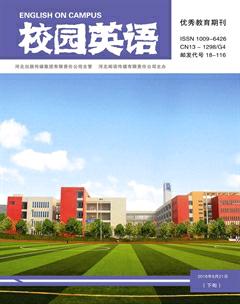A Brief Analysis on Classroom Questioning and Implications for Teachers
Qian Wang
【Abstract】In English teaching, classroom questioning accounts for a large proportion in EFL classroom, also is the concern of the majority of English teachers. The thesis aims to give teachers some implications by analyzing classroom questioning from different types of lessons. Classroom questioning is one of the most important parts of teaching activities, so teachers should adopt multiple questions and pay attention to the angles of questioning to improve teaching efficiency.
【Key words】classroom questioning; English classroom; types of lessons; implications
1. Introduction
Today under the environment of promoting quality education, to cultivate students ability of language communication gradually becomes the core significance of English teaching. It requires teachers to abandon traditional teaching methods in the past, and to make students learn in entertainment through well-designed classroom. Moreover, classroom questioning are a key link. Good questions are able to attract students attention, and to exercise students listening and speaking skills and English thinking ability to improve classroom efficiency.
Classroom questioning has been regarded as the core of effective teaching, and it is essentially the exchange between teachers and students, and among students themselves. Nowadays, as the curriculum reform continues to step into in-depth, more classroom questioning comes into being. Students are main parts in class, and if teachers ask questions appropriately in the light of different levels of students, according to different teaching contents, especially difficult points and important points in textbooks, thus can shorten teacher-student distance and make classroom atmosphere active.
2. The Definition of Classroom Questioning
According to Collins English Dictionary (6th Edition), questioning is defined as “being intellectually stimulated or being enthusiastic or eager for philosophical or other investigations”. In Oxford Advanced Learners English-Chinese Dictionary (7th Edition), questioning is conceptualized as “the activity of asking somebody questions”.
Sinclair and Coulthard (1975: 78) observed that the most common type of classroom activity is known as “IRF”-“Initiation - Response - Feedback”: the teacher initiates a question, and students come out an answer, and then the teacher gives feedback (assessment, comment, correction); then the teacher initiates the next question, and so on.
3. Classroom Questioning from Different Types of Lessons
The types of lessons, on the one hand it generates on the basis of the classification of various subjects; on the other hand it depends on abstractly generalizing a common feature of all kinds of teaching materials and methods. The types of English lessons vary with different angles: according to the teaching contents and tasks, they are divided into new lesson, review lesson and practice lesson; in the light of the skills training objectives, they are divided into listening, speaking, reading, writing and translating lessons. Two basic types of English lessons are dialogue lesson (listening and speaking) and reading lesson. As lots of teachers experience, different types of lessons can have different effects on classroom questioning.
For one thing, in new lesson teachers take leading questions depending on the content, in order to make students master new knowledge. If students participate in class positively, it will help them be equipped with new knowledge better. In review lesson and practice lesson, the number of questions will be more, because students have learned these contents, just to strengthen by review and practice. Teachers questions help examine students mastery of knowledge.
For another, if questions of listening lesson are to enable students to answer first according to listening materials, and encourage those students to answer questions positively (regardless of the answer is correct or not) with some small rewards, thus good classroom atmosphere will produce. The biggest feature of Chinese students is not to listen and afraid to listen, so teachers should often encourage them to listen boldly. Speaking lesson is taught by foreign teachers to increase students opportunity to speak in class. Foreign teachers questions tend to be more casual, and they have more standardized oral English, even along with their plentiful body language, thus it can make students in a natural and relaxing classroom environment to be more conducive into the classroom. Reading lesson is divided into intensive and extensive reading. The questions of intensive reading are heuristic questions, mainly to make students accurately understand the details of the text; while the questions of extensive reading are checking questions, and teachers simply need to make the targeted explanation. In writing lesson, the number of classroom questioning is even fewer. After teachers explain and give the topic, students begin writing their own compositions. As for the questions of translation lesson, teachers ask students to independently translate simple sentences and articles, or let them make groups to translate difficult contents, also ask questions and give guidance to students timely.
4. Implications & Conclusions
Teachers should adopt multiple questions to improve teaching efficiency. At present, except for classroom questioning from different types of lessons, it can be classified by different angles in the whole lesson. A complete teaching procedure includes lead-in, presentation, listening, talking, pair work, reading, writing, self-check and homework parts. Therefore, classroom questioning can be defined as four degrees—questions in lead-in, questions in transition, questions in teaching important points, questions in teaching difficult points, which will be discussed in various lessons.
References:
[1]Long,M.H.&C.J.Sato.1983.Classroom; foreigner talk discourse:Forms and functions of teachers questions[A].In eds.H.Selinger&M.Long.;
[2]Nunan,D.1991.Language Teaching Methodology:A Textbook for Teachers[M].New York:Prentice Hall.
[3]Oxford Advanced Learners English-Chinese Dictionary(7th Edition).Beijing:The Commercial Press,2009:1623.
[4]Sinclair,J.M.& M,Coulthard.1975.Towards an Analysis of Discourse:The English Used by Teachers and Pupils[M].London:Oxford University Press.
[5]曹菁.2000.大学英语阅读课教师提问的调查与分析[J].山东师大外国语学院学报第4期(总5期),102-107.
[6]付爱娟.新课改理念下对课堂提问的思考[J].石油教育,2007 (1):80-83.
作者简介:汪茜(1990-),女,回族,宁夏银川人,研究生,研究方向:英语教学。

